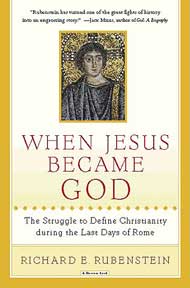Multimedia Reference Religion Travel |
 When Jesus Became God: The Struggle to Define Christianity During the Last Days of Rome Richard E. Rubenstein
Description From The Publisher: Compelling religious history, meticulously researched and passionately described. The story of Jesus is well known, as is the story of Christian persecutions during the Roman Empire. The history of fervent debate, civil strife, and bloody riots within the Christian community as it was coming into being, however, is a side of ancient history rarely described. Richard E. Rubenstein takes the reader to the streets of the Roman Empire during the fourth century, when a fateful debate over the divinity of Jesus Christ is being fought. Ruled by a Christian emperor, followers of Jesus no longer fear for the survival of their monotheistic faith but break into two camps regarding the direction of their worship. Is Jesus the son of God and therefore not the same as God? Or is Jesus precisely God on earth and therefore equal to Him? The vicious debate is led by two charismatic priests. Arius, an Alexandrian priest and poet, preaches that Jesus, though holy, is less than God. Athanasius, a brilliant and violent bishop, sees any diminution of Jesus' godhead as the work of the devil. Between them stands Alexander, the powerful Bishop of Alexandria, who must find a resolution that will keep the empire united and the Christian faith alive. With thorough historical, religious, and social research, Rubenstein vividly recreates one of the most critical moments in the history of religion. A Publishers Weekly Best Book of the Year Reviews [An]exceptionally lively account of the birth of orthodoxy...Rubenstein,a professor of conflict resolution rather than church history, is exceptionally clear-headed in explaining what the two schools believed and how brilliantly each fought for the right to make its view the official view....The fourth-century struggle between a heresy that wa not yet definitively heretical and an orthodoxy that was not yet definitively orthodox was a richly ideological one in which many on both sides were willing to die for an idea. Nothing makes for a good story like a good fight. Rubenstein has turned one of the great fights of history into an engrossing story. Jack Miles, The Boston Globe; author of God: A Biography
From Kirkus Reviews: One of the most compelling stories of Church history, insightfully told. As a Harvard Law School graduate, a professor of conflict resolution (George Mason Univ.), and a Jew, Rubenstein casts himself as an odd choice to chronicle early Christianity's crucial theological question: was Jesus human or divine? But as he demonstrates, the fourth-century controversy over the nature of Jesus had ramifications far beyond a simple christological dispute. As he puts it, ``the main doctrinal issue acted like a magnifying glass'' for all sorts of other questions: how would Christianity make the transition from persecuted sect to the established religion of Constantine's Roman Empire? Who would resolve theological disagreements and define orthodoxy? The chief players in Rubenstein's narrative are Athanasius, the scrappy, ruthlessly ambitious young priest who believed that Christ was fully human and fully divine, and his mortal enemy Arius, the popular advocate of subordinationism, the belief that Christ was subordinate to God's will. Athanasius built his power base through violence and the threat of it, hiring thugs to beat and harass clergy who opposed him. Arius was no saint either, and his theological disagreements with Athanasius and his followers quickly escalated into personal attacks. Rubenstein presents both theologians' views so persuasively that its easy to understand why Constantine was swayed by first one, then the other, as he tried to preserve harmony in the Church and the empire. The Council of Nicaea (325 a.d.) was supposed to resolve the christology once and for all, but Constantine kept changing his mind, as did his successors (Athanasius was exiled and then welcomed home no less than five times before his death in 373). By 381, advocating Arian views or possessing Arian writings had become a crime punishable by death. Nicene Christianity finally triumphed, but the doctrinal seeds had been planted for a major schism with the East seven centuries later. Perceptive, well-written Church history. -- Copyright ©1999, Kirkus Associates, LP. All rights reserved. Reader's Index Send us your favorite quotes or passages from this book. About the Author Richard E. Rubenstein is a professor of Conflict Resolution and Public Affairs at George Mason University, where he specializes in religious conflict. A graduate of Harvard College, Oxford University (Rhodes Scholar), and Harvard Law School, he lives in Fairfax, Virginia. Table of Contents
Customer Reviews Write your own online review. Look for Similar Books by Subject | ||||||||||||||||||||||||||||||||||||||||||||||||||||||||||
Copyright ©1996-2008 CenturyOne Bookstore. All Rights Reserved. All prices subject to change and given in U.S. dollars. Your purchase from CenturyOne.com will assist the CenturyOne Foundation in providing funding for various archaeological and research projects which seek to provide more information about the period of the First Century C.E., the origins of Christianity and the world of the Bible in general. All materials contained in http://www.centuryone.com are protected by copyright and trademark laws and may not be used for any purpose whatsoever other than private, non-commercial viewing purposes. Derivative works and other unauthorized copying or use of stills, video footage, text or graphics is expressly prohibited. |

